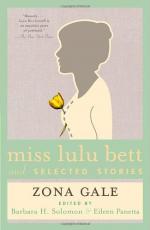“Lord sakes!” said Cornish.
This time he did rise and walk about. He wanted to say something, wanted it with passion. He paused beside Lulu and stammered: “You—you—you’re too nice a girl to get a deal like this. Darned if you aren’t.”
To her own complete surprise Lulu’s eyes filled with tears, and she could not speak. She was by no means above self-sympathy.
“And there ain’t,” said Cornish sorrowfully, “there ain’t a thing I can do.”
And yet he was doing much. He was gentle, he was listening, and on his face a frown of concern. His face continually surprised her, it was so fine and alive and near, by comparison with Ninian’s loose-lipped, ruddy, impersonal look and Dwight’s thin, high-boned hardness. All the time Cornish gave her something, instead of drawing upon her. Above all, he was there, and she could talk to him.
“It’s—it’s funny,” Lulu said. “I’d be awful glad if I just could know for sure that the other woman was alive—if I couldn’t know she’s dead.”
This surprising admission Cornish seemed to understand.
“Sure you would,” he said briefly.
“Cora Waters,” Lulu said. “Cora Waters, of San Diego, California. And she never heard of me.”
“No,” Cornish admitted. They stared at each other as across some abyss.
In the doorway Mrs. Bett appeared.
“I scraped up everything,” she remarked, “and left the dishes set.”
“That’s right, mamma,” Lulu said. “Come and sit down.”
Mrs. Bett entered with a leisurely air of doing the thing next expected of her.
“I don’t hear any more playin’ and singin’,” she remarked. “It sounded real nice.”
“We—we sung all I knew how to play, I guess, mamma.”
“I use’ to play on the melodeon,” Mrs. Bett volunteered, and spread and examined her right hand.
“Well!” said Cornish.
She now told them about her log-house in a New England clearing, when she was a bride. All her store of drama and life came from her. She rehearsed it with far eyes. She laughed at old delights, drooped at old fears. She told about her little daughter who had died at sixteen—a tragedy such as once would have been renewed in a vital ballad. At the end she yawned frankly as if, in some terrible sophistication, she had been telling the story of some one else.
“Give us one more piece,” she said.
“Can we?” Cornish asked.
“I can play ‘I Think When I Read That Sweet Story of Old,’” Lulu said.
“That’s the ticket!” cried Cornish.
They sang it, to Lulu’s right hand.
“That’s the one you picked out when you was a little girl, Lulie,” cried, Mrs. Bett.
Lulu had played it now as she must have played it then.
Half after nine and Di had not returned. But nobody thought of Di. Cornish rose to go.
“What’s them?” Mrs. Bett demanded.




